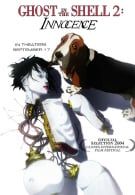Ghost in the Shell marked the renaissance of the “cyber-punk” era. Whereas it began in films like the classic Blade Runner and arguably the most popular anime of all time, Akira, Ghost in the Shell rejuvenated the hard-edged, high-tech science-fiction sub-genre and asked the questions that films before it had only hinted at. What is our role in the universe and will we outlast technology? Nine years later, the sequel, Ghost in the Shell 2: Innocence asks similar questions. Only now, they aren’t making any sense.
Set in the year 2032, Ghost in the Shell 2 details a world inhabited primarily by cyborgs (human minds in mechanized bodies) and “dolls” (robots with no human elements). Humans in both body and mind have taken a step back to their mechanical counterparts. One cyborg named Batou (voiced by Akio Ôtsuka), a detective for the government’s covert anti-terrorist unit, begins investigating a series of murders committed by “gynoids,” female robots designed specifically for sex, who malfunction and kill their masters. As the investigation continues, Batou and his partner, Togusa (voiced by Kôichi Yamadera), discover the involvement of the yakuza (Japanese mafia), high-ranking government officials, and corporate leadership.
The only human element Batou has left is the memory of his former partner, a cyborg known as the “The Major” (voiced by Atsuko Tanaka), whose mechanical body was lost at the end of the first film, but whose mind has since made its way into cyberspace.
Ghost in the Shell 2 is The Matrix Reloaded of anime sequels: a numbingly philosophical supposed lesson-in-life that takes a once-interesting theme about mankind—our obsession with technology—and bloats it to the point of confusion. There are scenes of such warped, never-ending theorizing that the viewer might give up trying to follow the dialogue. One scene has Batou and Togusa questioning a cyborg in a doll-house-like mansion. The scene plays over and over, like a broken record, for the sake of showing the heroes trapped in some kind of virtual continuum. Only as the questioning continues, topics ranging from our place in the universe to the very concept of life are discussed ad nauseum. The dialogue is laced with random quotes from the bible and the great thinkers, such as Descartes, and it only rarely makes any sense. The opening quote (“If our gods and our hopes are nothing but scientific phenomena, then it must be said that our love is scientific as well”) sets an appropriate tone, but never builds on it coherently.
The film is a pile-on of a sequel, adding next to little to complement the original. The ideas posed about whether or not “life” is a scientific process or one from the heart in the original Ghost in the Shell are all but repeated. Innocence is a standard-issue sequel: made for the sake of being made. The themes and characters are so deeply rooted in the original that even though it tries to stand on its own, it is unable to.
Where the series does at least evolve is in its hard-hitting action sequences. The fight scenes and shootouts are performed with a graceful furor, keeping the camera distant from the action and allowing the audience to appreciate every punch, kick, and flip. In times when the camera practically glues itself to our live-action heroes in order to hide what little is occurring, it is nice to see what is going on. Batou is given the chance to show himself as not only a practically unstoppable monster, but one gifted in martial arts and traditional boxing. Seeing him duke it out with kickboxing female robots has its kicks.
Ghost in the Shell 2 is well-intentioned in asking what makes us human and questions our fascination with the artificial: dolls, robots, even the internet. But the point of any deeply philosophical film is to send a message that can be understood, unfortunately, because Innocence is lost. I was, too.
Most Popular




